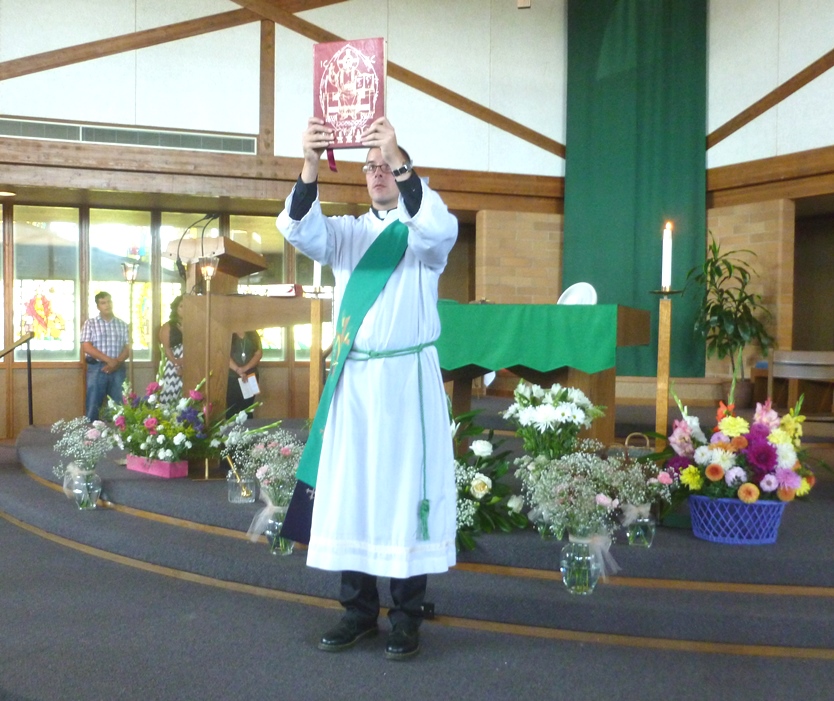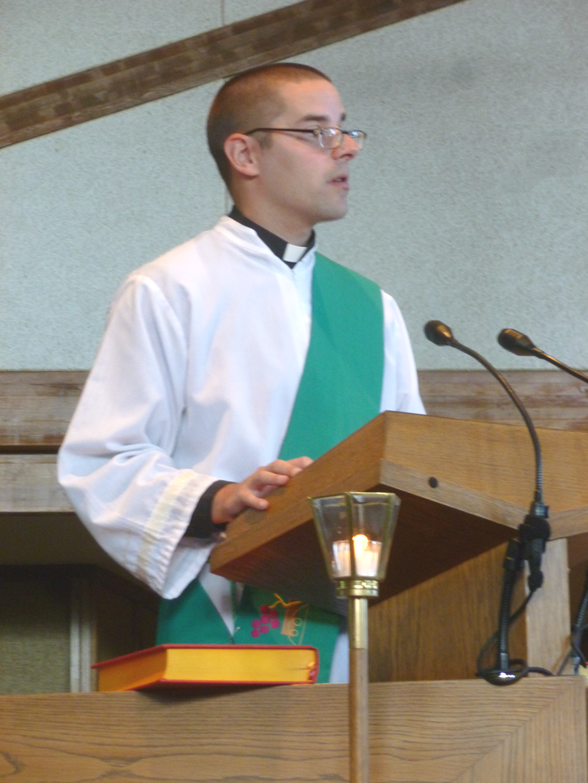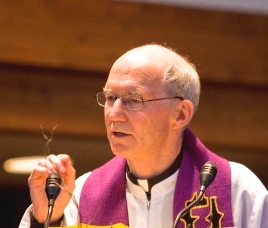|
Al mover por el capítulo seis del Evangelio de Juan y escuchar a Jesus dar de comer a la gente y explicar cómo él es el pan de vida hemos movido por el Antiguo Testamento a diferentes lugares descubriendo como el tema del pan de vida es expresada en escrituras pre-cristianos. Para los que se acuerdan, el fin de semana pasado hemos escuchado de Éxodo describiendo las multitudes que se quejaron contra Moisés y como se llenaron. El fin de semana anterior que estábamos en el segundo libro de Reyes y escuchamos la historia de cómo Eliseo multiplico los panes de cebada para dar de comer a la gente. Ahora estamos en el primer libro de Reyes con la historias de Elías huyendo para salvar su vida de la furia de Jezabel, la Reina de Israel y su esposo Acab. Jezabel estaba animando a la gente de Israel para adorar a dioses falsos mientras Elías estaba tratando de restaurar el culto correcto a Israel, animándolos a adorar al Señor. Elías destruye los profetas de Baal, Jezabel está enojada y Elías está huyendo para su vida. Él viaja un día en el desierto hasta no podía ir mas y se siente bajo un árbol. La traducción de la Biblia Americana Nueva especifica que es un árbol “solitario.” Entonces, después de huir al desierto para salvar la vida, inmediatamente pide la muerte. Bajo ese árbol, un ángel se le apareció y le da comida para sostenerlo en el viaje. Restaurado a salud y fuerza, Elías continúa su viaje para cuarenta días, un número simbólico de una duración larga de tiempo (como el tiempo de Jesus en el desierto o los cuarenta años del Éxodo). Al fin de estos cuarenta días de viaje, Elías llega al monte de Dios, el mismo lugar donde Moisés encontró a Dios y recibió los Diez Mandamientos. La nutrición dada bajo este árbol solitario provee comida para el viaje de volver a Dios. Árboles son usados como imágenes de vida, en las escrituras y en literatura en general. Arboles usualmente indican la presencia de agua y otros seres vivientes. He viajado por las partes sureñas de Israel, y les puedo decir que en muchos de los desiertos, especialmente en esa región, no hay muchos árboles. De hecho, el Mar Muerto está en el desierto en Israel, el único mar en el que lleva el nombre de muerte en lo que usualmente es símbolo de vida, el agua. Así podemos imaginar a Elías moviendo por este desierto y allá está un árbol solitario, creciendo en el campo de muerte árida. Es la vida en medio de la muerte. Bajo este árbol de vida, Elías encuentra fuerza, su salvación en la forma de nutrición que da la vida.
El viaje de Elías es un modelo para cada uno de nosotros de nuestra peregrinación cristiana. Cristo es nuestro árbol en el desierto, la Eucaristía es nuestra comida desde el cielo. Cuando la humanidad pecó contra Dios lo que era un jardín bello y fértil se hizo un desierto árido de muerte. El pecado y la muerte son plagas de la humanidad, pero Dios responde con un árbol en medio del desierto, vida creciendo entre muerte. En nuestro andar por el desierto de pecado, venimos a descansarnos bajo las ramas de consuelo, cansados de nuestro viaje espiritual y necesitamos nutrición. Estamos dado una comida especial salvífica para continuar nuestro viaje al Señor, para continuar nuestros cuarenta días largos por nuestras vidas. Eso no cualquier pan. Es un pan que ha sido dado a nosotros. Es el pan que emergido de un sacrificio. Este pan es el cuerpo de Cristo, “carne par la vida del mundo.” Igual que el pan tiene que ser partido para ser compartido, así el Cuerpo de Cristo fue partido en la madera de la cruz para dar vida a los atrapados en el desierto seco de pecado. Esta como ha emergido como una ofrenda voluntaria, no solamente de una persona sino de Dios mismo. Solo Dios puede crear la vida en el baldío de pecado. Solo Dios puede nutrirnos correctamente en nuestro viaje por el desierto volviendo a él mismo. El mundo continuamente busca una alegría y paz duradera., significado y libertad. Todos esfuerzos que se encuentra afuera del Señor han fracasado. Los partido políticos han fracasado, reyes han fracasado, las diversiones tienen solamente unas explosiones de placer que pasan rápidamente. Ciertas filosofías que han emergido desde el mundo han puesto a la gente al centro de un universo enfocado en ellos que ha traído destrucción y miseria. Como los israelitas en el desierto, el mundo ha dicho, “Estamos cansados de esta comida miserable.” La Eucaristía es la respuesta de Dios al mundo cansado de su viaje por el desierto. Somos una Iglesia Peregrina y la Eucaristía es nuestra comida peregrina. No solamente nos conduce a Dios, es Dios, el que da nutrición al alma. Dios nos da comer de sí mismo, con la sangre de su propio sacrificio. Sin este sacrificio, el mundo se quedara un baldío desolado de pecado. La carne dada por la vida del mundo nos da nutrición, en Dios es nuestro lugar de descanso. Por eso la Eucaristía es referida por la Iglesia como fuente de nuestra fe y la alteza de nuestra fe, porque de ese sacrificio de Cristo todo viene y nuestra fe siempre nos conduce a Cristo como el que da vida en el pan del cielo. As we have been moving through the sixth chapter of the Gospel of John and listening to Jesus feed the crowds and explain how he is the bread of life we have also been moving through the Old Testament to many different places discovering how the theme of the bread of life is expressed in the pre-Christian writings. For those who remember, last weekend we heard a reading from Exodus describing the hungry masses of people who were grumbling against Moses and how they were filled. The weekend before that we were in the second book of Kings and heard the story of how Elisha multiplied the loaves of barley to feed the people. Now we are in the first book of Kings picking up on the story of Elijah running for his life from the fury of Jezebel, the Queen of Israel and her husband Ahab. Jezebel was encouraging the people of Israel to worship false prophets while Elijah was trying to restore proper worship to Israel, he was encouraging them to worship the Lord. Elijah destroys the prophets of Baal, Jezebel is upset and Elijah is fleeing for his life. He journeyed for a day in the desert until he could not go any farther. Elijah must have been exhausted from the flight to the desert, burning up under the heat and afraid that the soldiers of Ahab and Jezebel were closing in on him. Perhaps Elijah was thinking about the Psalms during that frightful journey alone in the desert, for as it says in the Psalms, “the enemy pursues me, he crushes me to the ground.” But then he finds a tree. The New American Bible translation specifies that it was a “solitary” tree. Then, in one of the most ironic moves of the Old Testament, after fleeing to the desert to save his life, he immediately requests death. Under this tree, an angel appears to him and gives him food to nourish him for the journey. Elijah does not just eat this food once, the angel tells him to keep eating it. Finally, restored to health and strength, Elijah continues his journey for forty more days to the mountain of God, Horeb, which is also known as Sinai. It was under this tree that Elijah was given the food of life for his journey of forty days, a number also symbolic of a great duration of time (like Jesus’ time in the desert or the forty years of the Exodus). At the end of this forty day journey, Elijah arrived at the mountain of God, the same place that Moses encountered God and received the Ten Commandments. The nourishment given under this solitary tree provided food for the journey back to God. Trees are often used as images of life, both in scripture and in literature in general. Trees usually indicate the presence of water and other living beings. I have traveled to the southern parts of Israel, and I can tell you that in many of the deserts, especially in that region, there are not a lot of trees. In fact, the Dead Sea is in a desert in Israel, the only sea in the world that bears the name of death on what is usually a symbol of life, water. So we can imagine Elijah moving through this desert wasteland and there stands a solitary tree, growing in a field of arid death. It is life amongst death. Under this tree of life, Elijah will find his strength, his salvation in the form of life giving nourishment.
Elijah’s journey stands as a model for each one of us in our Christian pilgrimage. Christ is our tree in the desert, the Eucharist is our food from heaven. When humanity sinned against God, what was a beautiful, fertile garden of life became an arid desert of death. Sin and death plagued humanity, but God responded with a tree in the middle of a desert, life growing among death. In our wandering through the desert of sin, we come to rest under the comforting branches, tired from our spiritual journey and needing nourishment. We are given a special salvific food in order to continue our journey to the Lord, to continue our long forty days or journey throughout our lives. This is not just any bread though. It is bread that has been given to us. It is bread that has emerged from a sacrifice, the sacrifice of a body. The bread is the body of Christ, “flesh for the life of the world.” Just as bread must be broken in order to be shared, so Christ’s body was broken on the wood of the cross in order to give life to those trapped in the dry desert of sin. This food emerged from a voluntary offering, not just of a person, but of God himself. Only God can create life in wasteland of sin. Only God can properly nourish us for our trip through this desert back to himself. After all, sometimes the world today feels like a desert. GK Chesterton remarked that the doctrine of Original Sin is the one doctrine which can be proven because people of all faiths and walks of life should be able to agree on the fact that there is something wrong with human nature which needs to be remedied. We are missing something that it feels like we ought to have. The world is constantly seeking a lasting joy and peace, meaning and freedom. All efforts to find that outside of the Lord have failed. Political parties have failed, kings have failed, entertainments have only provided short bursts of pleasure that quickly fade. Certain philosophies that have emerged from the world have placed people at the center of a universe geared toward them, which has brought destruction and misery. Like the Israelites in the desert, the world has exclaimed that, “We are tired of this wretched food.” The Eucharist is God’s response to the world weary from its journey in the desert. We are a pilgrim Church and the Eucharist is our pilgrim food. It does not just lead us to God, it is God, the one that gives nourishment to the soul. God feeds us with himself, with the blood of his own sacrifice. Without this sacrifice, the world would remain a desolate wasteland of sin. The flesh given for the life of the world gives us nourishment, in God is our place of rest. Without God’s grace to accompany us on this journey we would find, as the angel said to Elijah in the first reading, that the journey would be too long for us. It would be all too easy to fall into despair and wonder where God’s presence is. It might be too tempting to wander back into that quagmire of sin and death. Christ’s sacrifice on the cross and his presence in the Eucharist is our compass that points us out of the desert and the strength to keep moving our souls away from sin and temptation. This is why the Eucharist is referred to by the Church as the source of our faith and our faith’s very height, because from that sacrifice of Christ everything is derived and our faith always leads us back to Christ as the one who gives life in the bread from heaven. |
AuthorHomilies in MP3 Audio Categories |



 RSS Feed
RSS Feed
